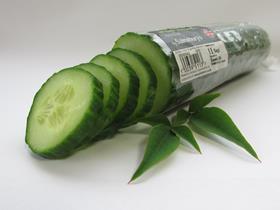
Cucumber growers and suppliers are at the heart of a price-centred conflict initiated by the supermarkets this season.
Supply and planting issues are also causing concern, alongside question marks over future-proofing. Richard Diplock, commercial director at Thanet Earth, notes that there’s “very little novelty or development in cucumber production at present”, with the Fresca Group-owned firm focusing on the higher-yielding, high-wire growing technique.
When it comes to recent growing conditions, Diplock says that light levels are down eight per cent on last year, when they were “exceptional”, but this year’s light level is at least up on 2013, which he says was “particularly poor”.
Luke Hibberd, commercial director at Abbey View Produce, adds: “Although conditions started well and have helped establish strong plants, a dip in the light levels around Valentine’s Day has held back volumes and fruit sizes for the early picks.”
Hibberd notes that production in the UK is down by approximately 10 per cent this year. As for elsewhere, Diplock says: “Supply and quality from Spain, the Canaries and Morocco has been good, but the cold snap in southern Europe over the month of January has reduced supply and pushed prices up.”
He adds: “Demand is starting to outstrip supply as Spanish and Canary availabilities take dramatic drops, coupled with darker days for the UK and Holland. The drop in Spanish availability has come about from poor plant maintenance and colder weather as growers have looked to reduce input costs in the face of lower-than-desired returns. This, in turn, is a reflection of the wider market, as retailers look to reduce prices on shelf and compete with discounters across Europe.”
These views are echoed by Diplock, who notes that it makes sense for some growers to switch to other products “with better commercial prospects”. For those who are standing by cucumbers, British and Dutch produce should be in full supply from mid-March.
Demand over Christmas and New Year was “exceptional”, according to Diplock, although that has since halted, but sales are still up year on year, boosted by supermarkets using whole cucumbers as a key price war product.
On this point, Hibberd says: “As with many products, a lower price to the final consumer often increases sales. This, however, can become unsustainable, and soon reaches a cap as it only attracts current consumers to buy more, as opposed to attracting new consumers.”
In terms of advancing the cucumber, and enticing the next generation of consumers, Diplock claims there is a “disappointingly low level of activity”, primarily caused by a lack of funding.
He adds: “There are some new virus-resistant varieties which show promise and look to be useful for growers, but there’s little in the way of visible developments which have to offer something fresh for the consumer.
“The snacking market for mini cucumbers is still under-developed, and holds lots of consumer potential. The challenge is that with today’s retail price of 50p for a whole cucumber, the mini-cucumbers appear expensive alongside.”
Hibberd, meanwhile, points to growing interest in using cucumbers in a wider range of processed products, from drinks to pre-packed salads – something he hopes will fuel greater interest in a “traditionally English product”.
Traditionally English, but superiorly Lea Valley, some argue. Lee Stiles, secretary at the Lea Valley Growers Association, tells FPJ that a PGI application lodged for the region’s cucumbers in 2011 might have mainly been publicised to highlight the quality of British cucumbers at a time when the market had been decimated by E. coli stories from Germany, but the rare chalk-stream filtration of the Lea Valley’s water, which, apparently, adds a sweeter taste to Lea Valley cucumbers means that that application could one day be revived.
European Vegetable Strategies 2015 takes place in Brussels on 6-7 May 2015. Pleaseclick here for more information and to register.



